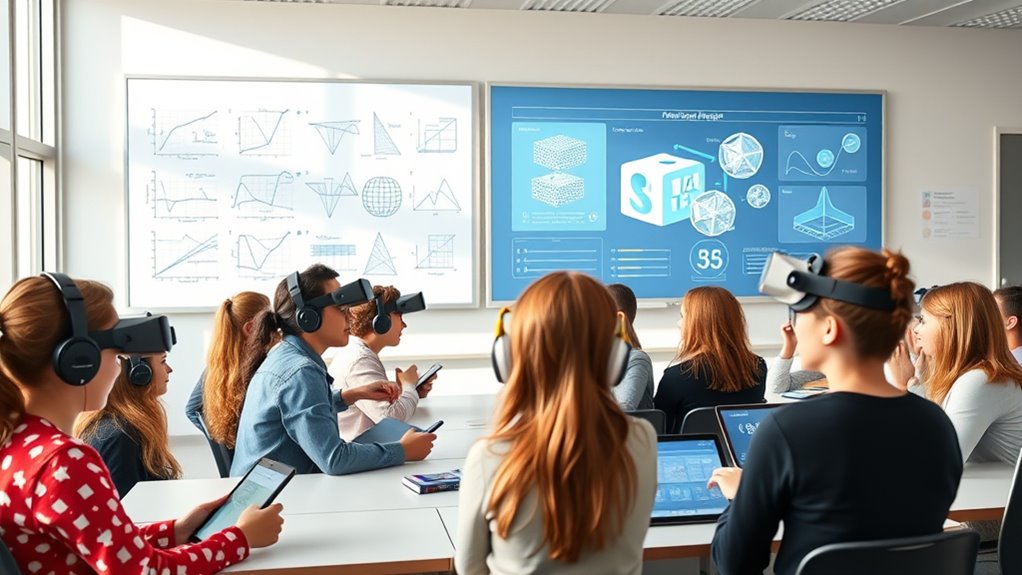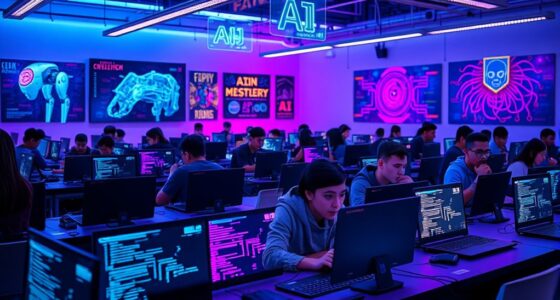AI greatly enhances gifted student programs by personalizing learning experiences just for you. It can adapt content in real-time, offering tailored challenges that match your strengths and interests. AI also helps teachers differentiate instruction, generate custom assessments, and create interactive resources. It promotes independent research and critical thinking while ensuring fair and inclusive access for all students. Keep exploring to discover how these innovations can transform your learning journey even further.
Key Takeaways
- AI personalizes learning by analyzing gifted students’ strengths, interests, and adjusting content in real-time to maintain engagement.
- It differentiates instruction through customized resources, activities, and curriculum modifications suited to individual needs.
- AI automates assessment creation, transforms static content into interactive resources, and streamlines grading processes.
- It supports research and critical thinking by enabling efficient information retrieval, multimedia presentations, and inquiry-based learning.
- AI promotes equity by identifying gaps, ensuring access, and assisting teachers with automation and tailored instructional tools.

Have you ever wondered how artificial intelligence can transform programs for gifted students? AI opens up exciting possibilities by creating personalized learning experiences that address each student’s unique needs. Instead of a one-size-fits-all approach, AI analyzes individual strengths, weaknesses, and interests to tailor content precisely. For example, it can dynamically adjust reading levels in real-time, guaranteeing students are consistently challenged without feeling overwhelmed. This adaptability helps gifted learners stay engaged and continue growing academically.
AI personalizes learning by adapting content and challenges to meet each gifted student’s unique strengths and interests.
AI also plays a crucial role in differentiating instruction. By examining student data, it identifies preferred learning styles and interests, then supplies customized resources that resonate with each learner. Imagine math problems or vocabulary exercises generated specifically around topics a student finds fascinating—that’s AI at work boosting motivation and comprehension. Moreover, AI supports acceleration and enrichment by offering advanced materials and activities, enabling gifted students to push beyond standard curricula and explore deeper concepts at their own pace.
Curriculum adaptation is another area where AI shines. It can modify existing materials to better suit gifted students’ advanced understanding and inquiry needs. Teachers can use AI tools to generate tailored assessments that accurately reflect a student’s current knowledge and areas for further challenge. These tools can transform static texts into interactive digital resources or convert videos into engaging assessments that test comprehension and critical thinking. This automation not only enhances the learning experience but also streamlines grading and evaluation, reducing the workload for teachers while maintaining high standards.
AI further supports gifted students by enhancing their research and communication abilities. With AI-driven search tools, students can efficiently gather and synthesize information, fostering independent inquiry. They can also diversify their presentations by transforming written content into multimedia formats using platforms like Canva’s AI features, making their work more professional and visually appealing. AI encourages higher-order thinking through structured debates and inquiry-based discussions, helping students develop critical thinking, argumentation, and questioning skills.
Additionally, understanding asset division laws helps ensure that gifted students and their families navigate legal considerations effectively when planning for future needs. For teachers, AI significantly boosts productivity by automating routine tasks like lesson plan creation and assessment design. This automation frees up your time, allowing you more opportunities to provide personalized support and enrichment for gifted learners. AI tools also simplify tracking diverse student needs, making differentiation easier and more effective. With AI, you can convert existing educational content into personalized pathways, streamline classroom management, and implement tailored instructional strategies that meet the unique demands of gifted programs.
In integrating AI into gifted education, it’s essential to contemplate ethical practices and guarantee responsible use. When used thoughtfully, AI becomes a powerful ally—enhancing learning, supporting teachers, and unlocking the full potential of gifted students. Recognizing educational equity considerations ensures that AI-driven resources serve all students fairly and inclusively. Additionally, leveraging data analysis capabilities can help identify gaps and ensure equitable access for every learner. Incorporating ethical standards in AI deployment further ensures that student privacy and data security are maintained, fostering trust and integrity in educational settings. Furthermore, collaboration with stakeholders can help ensure AI is used to promote inclusive education for all learners.
Frequently Asked Questions
How Does AI Personalize Learning for Gifted Students?
You might wonder how AI personalizes learning for gifted students. AI analyzes their data to identify strengths, weaknesses, and learning styles. It then provides tailored resources, adjusts the pace of lessons, and offers more advanced challenges. By continuously monitoring progress, AI helps create customized educational pathways that keep students engaged and motivated. This way, you can guarantee each gifted learner receives the support and stimulation they need to thrive.
What Are Potential Ethical Concerns With AI in Gifted Programs?
You should consider the ethical concerns around AI, such as bias and stereotyping, which can limit fairness and reinforce existing inequalities. You also need to be mindful of privacy issues, ensuring data is collected and stored securely with proper consent. Additionally, watch for overreliance on technology, which might hinder human interaction and critical thinking. Balancing AI’s benefits with these risks is essential for responsible integration.
How Can AI Identify Hidden Talents in Students?
You can use AI to identify hidden talents by analyzing large amounts of student data, including performance, behavior, and creative output. AI employs predictive models and machine learning algorithms to detect patterns and potential that might not be obvious. It creates detailed student profiles and offers adaptive assessments, helping you discover skills and strengths early on. This targeted approach enables personalized support, fostering students’ unique abilities effectively.
What Training Is Required for Educators to Implement AI Tools?
Think of training as planting seeds for future innovation. To implement AI tools effectively, you need foundational knowledge of AI concepts and ethical considerations. Hands-on experience with AI software for curriculum adaptation, assessment, and multimedia projects is essential. You should also learn how to seamlessly integrate AI into your teaching, customize learning experiences, and stay updated through ongoing professional development—all while fostering responsible, bias-free use to release each student’s potential.
How Does AI Ensure Equitable Access for All Gifted Students?
You want to know how AI guarantees equitable access for all gifted students. AI personalizes learning, offering tailored experiences that meet individual needs and reduce barriers. It lowers costs for screening and assessments, making gifted programs more accessible. AI also provides resources to underserved communities and supports diverse learners. By automating routine tasks, teachers can focus on inclusivity. However, careful implementation is essential to prevent widening existing inequalities.
Conclusion
Think of AI as a guiding lighthouse for gifted students steering the vast ocean of potential. It illuminates hidden talents and charts personalized paths, ensuring no student drifts off course. With AI as your steadfast beacon, you can confidently support each learner’s journey, helping them reach new heights. As the lighthouse steadies the ship in stormy waters, AI steadies your efforts, making sure every gifted student finds their way to success.










